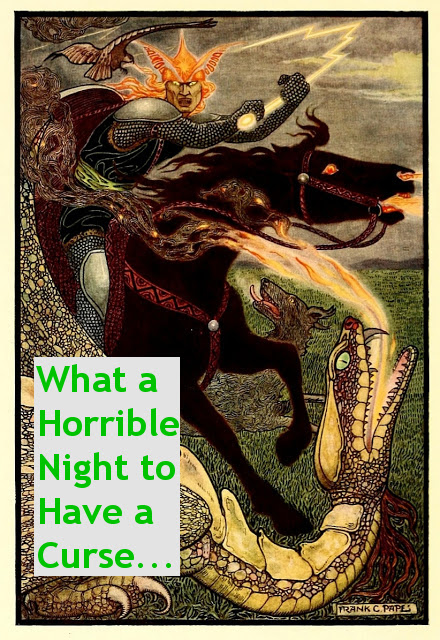This post is related to several recent posts by Alexis over at Tao of D&D. Like him or not, he's a smart guy and I think he's been posting some quality content recently (not ONLY recently, but I've really liked his stuff of late).
In old school D&D circles (including but not limited to the OSR), you often hear one of the things that sets old school play apart from new school play is the fact that the old school game doesn't try to anticipate every eventuality, which requires DMs to improvise and make rulings. New school games try to be comprehensive in their coverage, often by providing a universal mechanic for actions. To be fair, though, there are quite a few older games that have universal mechanics. I've been playing WEG d6 Star Wars, definitely an old school game, and it has a universal die pool mechanic. But even then, reading through the 1st edition reprint I bought a while back, there are a LOT of holes in the rules that aren't covered. The referee has leeway to make calls.
Anyway, that argument about what is old school or new school is beside the point. We're here to talk about rulings in the game, not what makes something old school or new school (today at least).Why the emphasis on rulings in old school play? Well, as far as I can figure it, it comes from Matt Finch's Old School Primer. It's the title of the first of his four Zen moments. He may have gotten the phrase from somewhere else, but it's likely the Primer that made it famous.
In the Primer, the section talks about how description should trump die rolls and common sense should trump dedicated game mechanics. I don't have a problem with that. It's advice I would generally follow, except for the fact that where the rules stipulate die rolls for game purposes, that should trump "common sense." What do I mean by that? Well, there are examples in the Primer of things like having players ask questions, get detailed descriptions, and use those descriptions to disarm traps or find secret doors or things like that. I think that's great. But if we're playing old school D&D, we DO have definite mechanics defined by the rules for these things. If players can, through smart use of description and questions/answers about the state of the game world, discover a secret door or trap or hidden treasure, or can sweet talk the guard to let them talk to the prisoner or get into the Duke's Ball without an invitation, that's fine. But if their description falls short, we have the die roll prescribed by the rules to see if they stumble upon the right answer despite the players' descriptions falling short.
I don't think that's a controversial position, but I have seen many times people on blogs, on Google+ back when that was a thing, on message boards (which I rarely frequent these past 10 years or so), or other online places talking about "rulings not rules" in a different way. These people seem to think that rulings should trump the rules. There's "the rule of cool" and the various improv theater derived "say yes" rules: "say yes, and", "say yes, but" or "say yes or roll the dice" that all seem to be coming from a desire to improve the game, but in my opinion, may ruin it.
The rule of cool says that if players want to do something cool and awesome like in a movie or video game, let them. The various say yes rules tell the referee to never deny players anything, unless the dice determine it so. You can't deny them, only give limitations through "and" or "but" statements.
Newer versions of D&D (since 3E) try to cover as many situations
as possible, in as much detail as possible. And players of those games
have been, in my experience, the ones decrying a game based on rulings not rules as
mother-may-I. I think they're not quite accurate in their claims, but
they do have a valid point. If there's a rule in the book that covers something, why is there a need for an arbitrary ruling?
Honestly, there have been some times in a game where players have such an interesting (or funny, or ridiculous) plan that I just go ahead and say sure, you can do that (rule of cool). But not every time. Maybe I'm inconsistent. Maybe that is me playing mother-may-I with them. I'm trying to be better. More consistent.
Here are how I think rulings should be used during a game, and how "rulings not rules" should really be interpreted to avoid mother-may-I situations.
First of all, the DM needs to know the rules well enough. They don't need to have everything memorized (although that's the ideal), but they need to know the basics and be familiar with the less often used rules. Once that condition is satisfied, there are four situations that may come up which require a ruling:
1. When a situation arises in game in which clever play by the players would circumvent the need for a roll, then the DM can make a call that that action succeeds without a roll. That's the first kind of ruling, and the thing Finch was talking about in the Primer.
2. When a situation arises in game and the DM has forgotten the rule, and they know it will take time to look up the actual rule, then they should make a ruling in that instance to keep the game moving. If the rule is something they can easily find in the rules (a spell description for example) then they should NOT make a ruling, they should look up the proper rule. It only takes a short time and shouldn't interrupt the flow of the game. After the game, the DM should look up the rule and get to know it better.
3. When a situation arises in game that is definitely not covered by the game's rules, the DM in this instance must make a ruling. In this case, it is a good idea to record the ruling, and pending consideration by the DM, and possibly consultation with the players, it should then become the new rule for that situation in the future.
4. When there is a dispute among players (including the DM) about the interpretation or implementation of a rule in the game, then the DM needs to make a ruling as to how it will be interpreted in their game. Again, the DM may wish to consult with the players for their opinions, but as with any ruling, the DM gets the final say. Again, this should be recorded and kept for reference in the future.
In any other situation, the onus is on the DM to know the rules and implement them fairly. Arbitrary judgments that aren't recorded to set precedents for future games are exactly the sort of thing those players were afraid of when they said "rulings not rules" is just mother-may-I.




